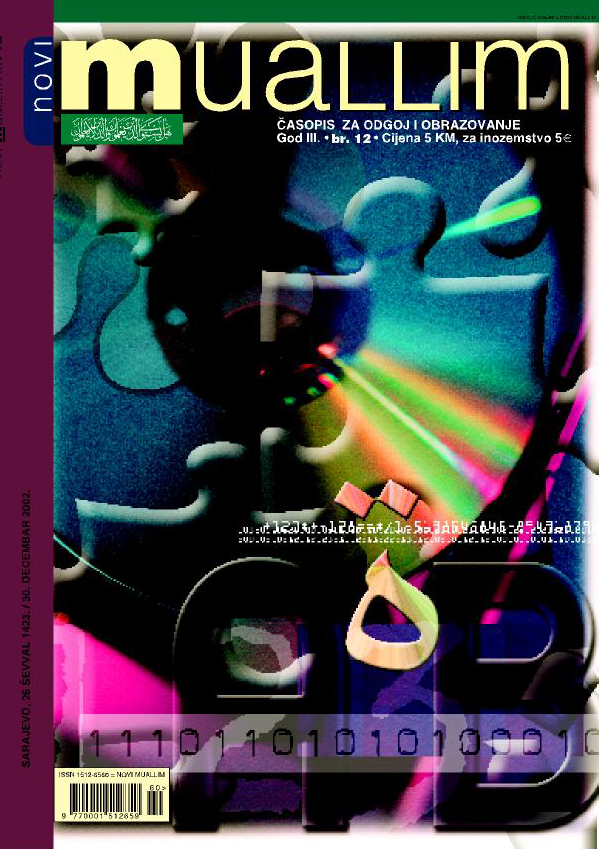THE STUDY OF RELIGION AND RELIGIOUS STUDIES IN NORWAY
(PREDAVANJE NA FAKULTETU ISLAMSKIH NAUKA, 28. X 2002.)
DOI:
https://doi.org/10.26340/muallim.v3i12.1486Abstract
The History of Religions differs from Theology i.a. in its stance of methodological agnosticism. It seeks both to understand religion from within, on the premises of the believers, and from without, applying theoretical or comparative frameworks that believers may find alien. Reducing believers to objects of study is no longer an option; increasingly they lake on the role of subjects, in dialogue with researchers. In Norway, the field dates to 1898, with the first Chair established in 1914. It devcloped in a noncolonial context from auxiliary disciplines to Christian theology, i.e. the study of ancient Near Eastern languages and religions. Egyptology, and later Coptic and Gnostic studies, were long a mainstay of the field, while Islam was studied in the Semitic context. Today there is an accent on living world religions, and Islam is an important study in it own right, partly due to the significant presence of Muslim immigrants (and converts) and the challenges Norway faces as a multi-cultural society. Students may take a one-year course in the History of Religions with a third semester specialising in Islam (among other options). A knowledge of Arabic is not required, and the course literature is a mixture of classic Orientalist works and contemporary surveys, mainly in English. There is not yet an institutionally cohesive, mature field of lslamic Studies in Norway, but the author believes it will have to develop soon. He belongs to a circle of researchers that focus on religion and human rights, and that seek coopcration and dialogue with Muslirn intellcctuals with similar concerns, i.a. with staff at the Faculty of Islamic Studies in Sarajevo.
Summary
The History of Religions differs from Theology i.a. in its stance of methodological agnosticism. It seeks both to understand religion from within, on the premises of the believers, and from without, applying theoretical or comparative frameworks that believers may find alien. Reducing believers to objects of study is no longer an option; increasingly they lake on the role of subjects, in dialogue with researchers. In Norway, the field dates to 1898, with the first Chair established in 1914. It devcloped in a noncolonial context from auxiliary disciplines to Christian theology, i.e. the study of ancient Near Eastern languages and religions. Egyptology, and later Coptic and Gnostic studies, were long a mainstay of the field, while Islam was studied in the Semitic context. Today there is an accent on living world religions, and Islam is an important study in it own right, partly due to the significant presence of Muslim immigrants (and converts) and the challenges Norway faces as a multi-cultural society. Students may take a one-year course in the History of Religions with a third semester specialising in Islam (among other options). A knowledge of Arabic is not required, and the course literature is a mixture of classic Orientalist works and contemporary surveys, mainly in English. There is not yet an institutionally cohesive, mature field of lslamic Studies in Norway, but the author believes it will have to develop soon. He belongs to a circle of researchers that focus on religion and human rights, and that seek coopcration and dialogue with Muslirn intellcctuals with similar concerns, i.a. with staff at the Faculty of Islamic Studies in Sarajevo.
Downloads
Published
How to Cite
Issue
Section
License
Naknada:
a. Časopis ne naplaćuje naknadu za obradu članaka (APC) i naknadu za podnošenje članaka.
Autori koji objavljuju u ovom časopisu pristaju na sljedeće uvijete:
- Autori zadržavaju autorska prava i pružaju časopisu pravo prvog objavljivanja, pri čemu će rad jednu godinu po objavljivanju biti podložan licenci Creative Commons imenovanje koja omogućuje drugima da dijele rad uz uvijet navođenja autorstva i izvornog objavljivanja u ovom časopisu.
- Autori mogu izraditi zasebne, ugovorne aranžmane za ne-ekskluzivnu distribuciju rada objavljenog u časopisu (npr. postavljanje u institucionalni repozitorij ili objavljivanje u knjizi), uz navođenje da je rad izvorno objavljen u ovom časopisu.


